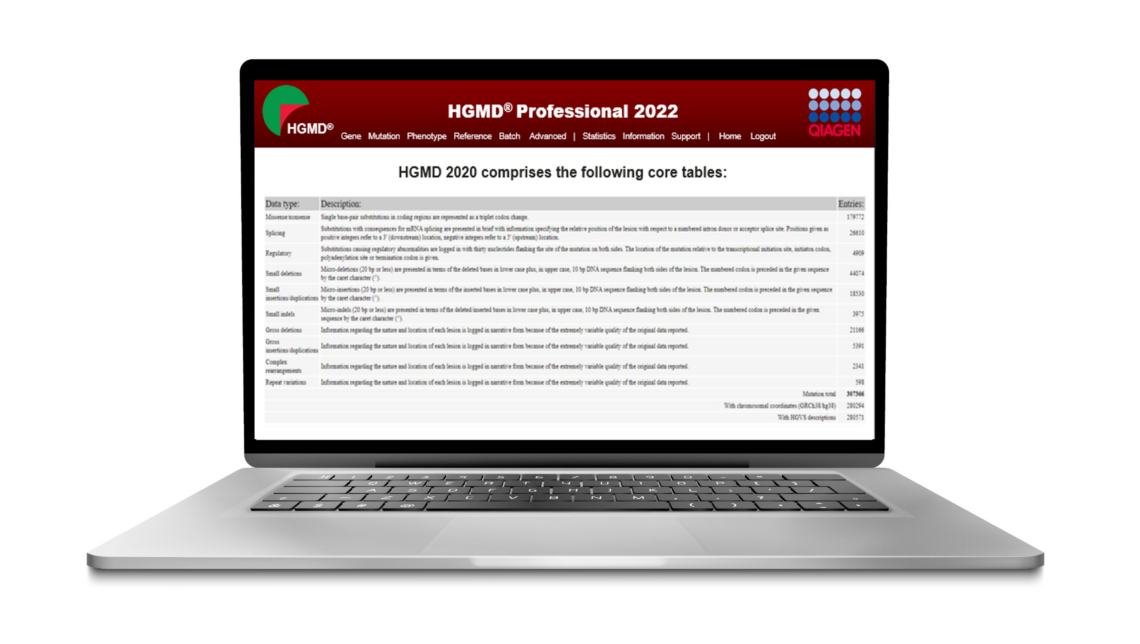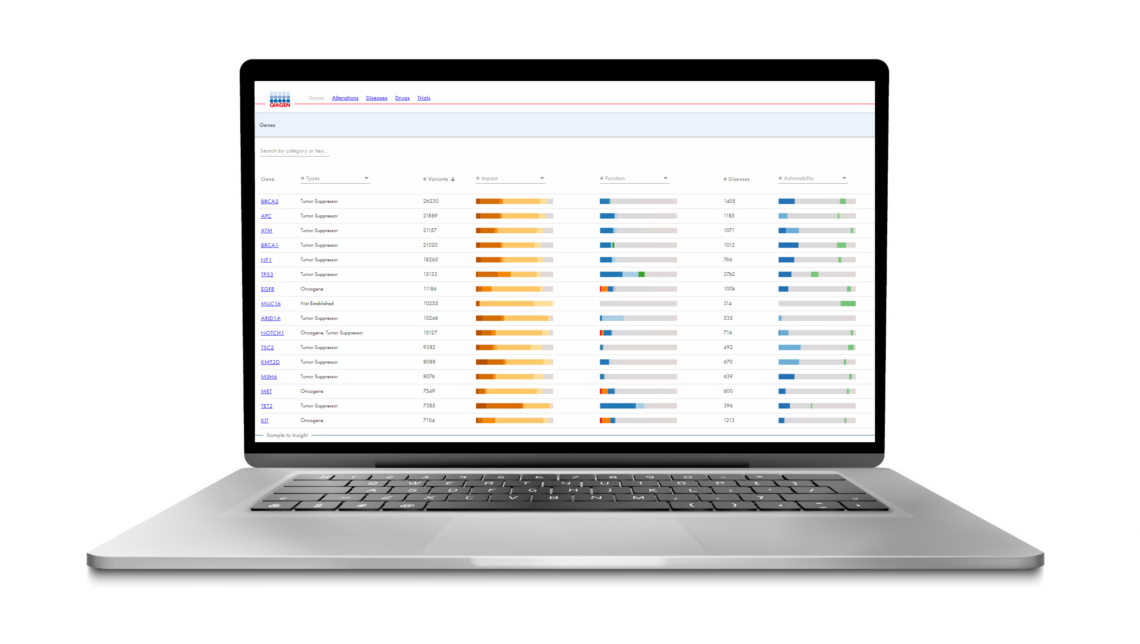
HGMD vs. HSMD
Genomic databases are the central component of accurate variant interpretation. The Human Gene Mutation Database (HGMD) Professional and the Human Somatic Mutation Database (HSMD) offer expert-curated genomic evidence to help clinical diagnostic labs and clinical genetics professionals accelerate and enhance variant interpretation.
Overview
Whether your clinical diagnostic lab needs to filter, annotate and interpret clinically relevant variants faster, or you are a clinical geneticist or genetic counselor that needs an easier way to review medical literature and therapeutic options, both HGMD Professional and HSMD can help you reduce turnaround time and accelerate throughput.
However, the biggest differentiators between both databases is the type of genomic content, features, and applications. In our HGMD vs. HSMD comparison, we take a deep-dive into the differences between the two resources to help you make a more informed decision about which database to select for your clinical lab or business. In addition, you may find that your scope of work can benefit from licensing both databases. For those customers, we offer bundle packages.

HGMD Professional
HGMD Professional is a comprehensive collection of germline mutations in nuclear genes that are associated with human inherited disease. Founded and maintained by Cardiff University and exclusively licensed through QIAGEN, the database records all germline disease-causing mutations and disease-associated/functional polymorphisms reported in the literature. HGMD Professional now constitutes, de facto, the central disease-associated mutation database available to the scientific community.

HSMD
The somatic counterpart to HGMD Professional, HSMD contains extensive genomic content relevant to solid tumors and hematological malignancies. Developed and maintained by QIAGEN, the database leverages variant content from two sources: expert-curated content from the QIAGEN Knowledge Base (QKB) and data from real-world oncology cases sourced from QIAGEN’s professional clinical interpretation services. HSMD provides deep insight into clinically observed somatic variants.
HGMD vs. HSMD: What's the difference?
HGMD Professional attempts to systematically collate all known gene lesions responsible for causing human inherited disease together with disease-associated/functional polymorphisms that have been published in the peer-reviewed literature. These data comprise single base-pair substitutions in coding, regulatory and splicing-relevant (both intronic and exonic) regions of human nuclear genes, as well as micro-deletions and micro-insertions, combined micro-insertions/micro-deletions (indels) of 20 basepair or less, repeat variations, gross lesions, and complex rearrangements (including inversions, translocations and complex indels). Mutation data are summarized here.
HGMD Professional does not include either somatic or mitochondrial mutations, which are well covered by HSMD.
HSMD contains extensive genomic content relevant to solid tumors and hematological malignancies from peer-reviewed literature and over 419,000 real-world clinical oncology cases. The resource focuses on providing deep insight into small variants, such as SNVs, indels, frameshifts, fusions and copy number variants that have been clinically observed or curated from scientific literature to help users better understand and define precise function and actionability.
HSMD does contain both somatic and hereditary mutations relevant to cancer. However, the clinically observed mutations in the database are predominantly somatic. Yet, the clinically observed dataset does include some germline variants in genes associated with both hereditary predisposing syndromes and somatic cancers. View the complete database statistics here.
HGMD Professional is an expert-curated database. A curation team at the Institute of Medical Genetics at Cardiff University manages and updates the database. HGMD Professional screens the peer-reviewed biomedical literature on an ongoing basis. Relevant articles are identified via manual inspection of a core selection of 3,100 journals, supplemented by the use of online computerized procedures utilizing Google Scholar, publishers’ websites and PubMed, to survey the wider literature.
Articles identified as potential sources of mutation data are assessed by a team of experienced curators (with an average of more than 12 years of experience in curation). Discrepancies in variant reporting that require additional scrutiny are identified in approximately 20% of articles. The curation team resolves discrepancies by consulting additional information reported in the manuscript or by referring to supplementary material (chromosomal coordinate, sequence chromatogram, etc.). However, approximately 75% of these ambiguities necessitate direct contact with the authors. In those cases, the curation team contacts the authors to clarify discrepancies.
HSMD is an expert-curated database. The curation team at QIAGEN Digital Insights manages and updates the database. HSMD leverages variant content from two sources: expert-curated content from the QIAGEN Knowledge Base (QKB) and data from real-world oncology cases sourced from QIAGEN’s professional clinical interpretation services.
The QIAGEN Knowledge Base is powered by augmented molecular intelligence (AMI). AMI combines artificial intelligence (AI) and human expertise to advance and accelerate clinical content curation. Over 200 certified curators work alongside machines to efficiently identify, extract, and align evidence from scientific literature and over 40 public and proprietary databases in the QKB.
In addition, HSMD contains data on clinically observed variants. When a variant is “clinically observed,” it means our professional clinical interpretation service has encountered this alteration in a real-world clinical case. For these variants, our team assesses the clinical and biological relevance and calculates the gene and variant prevalence across observed tumor types.
Unlike Genomenon, or other databases that rely solely on computerized curation, HSMD leverages human judgement and expertise—every catalogued mutation has been “touched” by a trained scientist to ensure accuracy, relevance, and context.
HGMD Professional allows you to search by:
- Genes
- Alterations
- Phenotype
- Diseases
- Citations
With this content, you gain insights into:
- Disease associations
- Functional impact
- Diagnostic relevance
- Population frequency
- Clinical outcomes
HSMD allows you to search by:
- Genes
- Alterations
- Diseases
- Drugs
- Clinical trials (local, regional, national, and global)
With this content, you gain insights into:
- Disease associations
- Functional impact
- Diagnostic, prognostic, and therapeutic relevance
- Clinical outcomes
HGMD Professional contains an expansive set of tools that support a broad range of applications in the fields of clinical diagnostics, genetic counseling, and NGS/bioinformatics research.
- Interpret clinical test results
- Filter and prioritize WES/WGS data
- Check known genotype-phenotype relationships
- Access mutation data in Variant Call Format (VCF)
- Improve variants of unknown significance (VUS) management
- Evaluate secondary findings
- Customize and design gene panels
HSMD is a flexible, easy-to-use database that supports a broad range of precision oncology and clinical research applications.
- Analyze complex reports
- Find off-label therapies
- Enhance molecular tumor board recommendations
- Improve variants of unknown significance (VUS) management
- Evaluate secondary findings
- Customize and design gene panels
HGMD Professional is updated quarterly. This allows access to up-to-date germline mutation data. On average, HGMD Professional adds 45,000 new mutation entries each year to the database. This number is expected to increase as curation efforts are expanded.
HSMD is updated quarterly. This enables access to up-to-date somatic mutation data. A minimum of 70,000 new clinical oncology cases will be added to HSMD each year. From these 70,000 new clinical oncology cases, QIAGEN’s professional variant interpretation service adds a minimum of 60,000 clinically observed variants each year.
HGMD Professional is the subscription version of HGMD and is available to commercial and academic customers via licensing through QIAGEN. Mutation data are made freely available via the public version of HGMD 3 years after inclusion in HGMD Professional. Therefore, HGMD Professional is essential for checking the novelty of newly found mutations. In addition, HGMD Professional contains many features not available in the free public version. Learn more about the difference between HGMD Professional and HGMD (free version) here.
HSMD is offered only through a paid subscription service. There is no free version of HSMD. However, you can access HSMD through the standard web application. Or, you can use HSMD Software Developer to easily integrate the database into your in-house analytical pipeline. HSMD Software Developer enables you to access the full HSMD online content via endpoints (API keys).
Bundle HGMD Professional and HSMD
HGMD Professional and HSMD are complementary databases. For clinical diagnostic labs and users who work in germline and somatic applications, QIAGEN Digital Insights offers a special bundle package for both databases. Customers may be eligible for a discounted licensing price. If interested, complete one or both of the trial request forms below and a sales representative will contact you about pricing options.